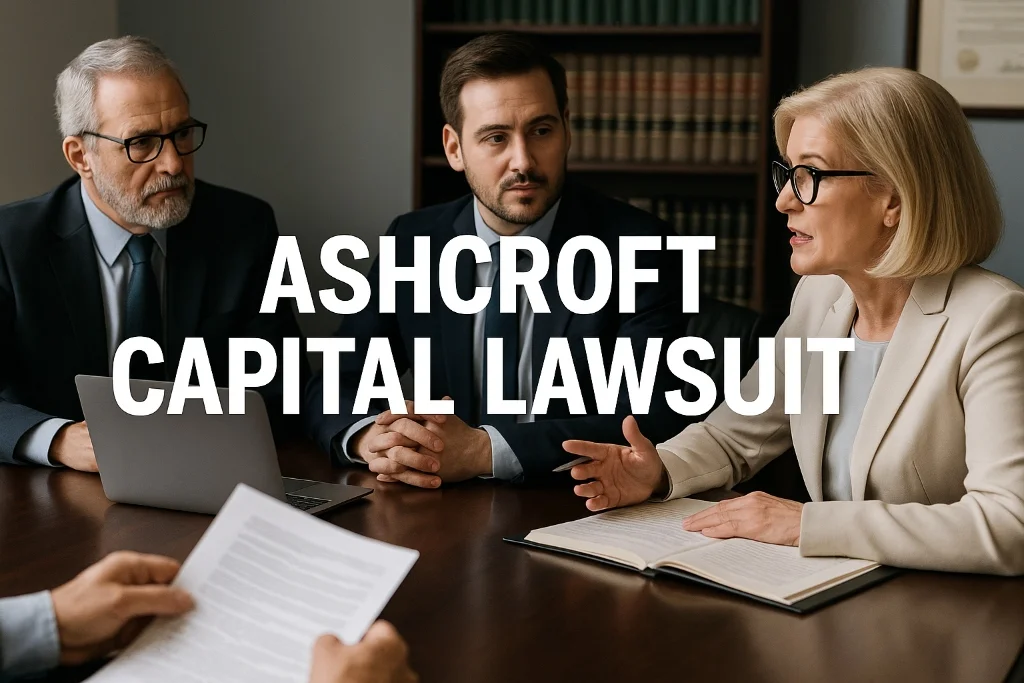Ashcroft Capital, a prominent real estate investment firm, has recently faced legal scrutiny due to an ongoing lawsuit. This case has drawn significant attention from investors, tenants, and industry experts. In this article, we delve into the details of the Ashcroft Capital lawsuit, examining the allegations, legal proceedings, potential implications, and what it means for stakeholders.
Background on Ashcroft Capital
Ashcroft Capital is a private equity firm specializing in multifamily real estate investments. Founded by Frank Roessler, the company focuses on acquiring and managing high-quality apartment communities across the U.S. With billions in assets under management, Ashcroft Capital has built a reputation for delivering strong returns to investors.
However, recent legal challenges have raised concerns about the firm’s business practices.
Overview of the Ashcroft Capital Lawsuit
The Ashcroft Capital lawsuit stems from allegations related to financial mismanagement, breach of fiduciary duty, and deceptive business practices. The plaintiffs—primarily investors and tenants—claim that the firm engaged in misconduct, leading to financial losses and unfair treatment.
Key Allegations in the Lawsuit
-
Misrepresentation of Investment Opportunities
-
Investors allege that Ashcroft Capital provided misleading information about projected returns and risks associated with certain properties.
-
Some claim that the firm overstated asset values to attract more capital.
-
-
Breach of Fiduciary Duty
-
Plaintiffs argue that Ashcroft Capital failed to act in the best interests of its investors.
-
There are claims that the firm prioritized its profits over investor returns.
-
-
Tenant Disputes and Unfair Practices
-
Some lawsuits involve tenant complaints about excessive fees, poor maintenance, and unjust evictions.
-
Tenants allege that Ashcroft Capital engaged in aggressive rent hikes and neglected property upkeep.
-
-
Regulatory Violations
-
The lawsuit includes accusations of non-compliance with real estate and securities laws.
-
Regulatory bodies are investigating whether Ashcroft Capital violated disclosure requirements.
-
Legal Proceedings and Current Status
The Ashcroft Capital lawsuit is still unfolding, with multiple cases in different jurisdictions. Here’s an update on the legal proceedings:
-
Class-Action Status: Some cases are seeking class-action certification, which could allow more investors and tenants to join the lawsuit.
-
Settlements & Denials: Ashcroft Capital has denied wrongdoing but is reportedly in settlement discussions for some claims.
-
Regulatory Investigations: State and federal agencies are reviewing the allegations, which could lead to fines or further legal action.
Potential Implications of the Lawsuit
The outcome of the Ashcroft Capital lawsuit could have far-reaching consequences:
For Investors
-
Loss of confidence in private real estate investments.
-
Possible financial recoveries if plaintiffs win the case.
-
Increased scrutiny of fund disclosures and due diligence processes.
For Tenants
-
Potential compensation for unfair rental practices.
-
Improved tenant protections if regulatory changes follow.
For Ashcroft Capital
-
Financial penalties and reputational damage.
-
Possible restructuring of business operations to comply with legal standards.
How Ashcroft Capital is Responding
Ashcroft Capital has publicly denied the allegations, stating:
“We are committed to transparency and ethical business practices. These claims are without merit, and we will vigorously defend our position in court.”
The firm has also emphasized its track record of successful investments and tenant satisfaction.
Lessons for Real Estate Investors
The Ashcroft Capital lawsuit serves as a cautionary tale for investors and operators in the real estate sector:
-
Conduct Thorough Due Diligence – Verify financial projections and property conditions before investing.
-
Review Legal Compliance – Ensure that fund managers adhere to securities and real estate laws.
-
Monitor Tenant Relations – Ethical property management is crucial for long-term success.
Conclusion
The Ashcroft Capital lawsuit highlights the legal and financial risks in real estate investing. While the case is ongoing, its outcome could reshape industry practices and investor expectations. Stakeholders should stay informed and consider the broader implications of this legal battle.
For updates on the Ashcroft Capital lawsuit, follow reputable legal and financial news sources.
1. What is the Ashcroft Capital Lawsuit About?
The Ashcroft Capital lawsuit involves allegations of financial mismanagement, breach of fiduciary duty, and deceptive business practices. Investors and tenants claim that the real estate investment firm misrepresented investment opportunities, failed to act in their best interests, and engaged in unfair rental practices.
2. Who is Ashcroft Capital?
Ashcroft Capital is a private equity firm specializing in multifamily real estate investments. Founded by Frank Roessler, the company acquires and manages apartment communities across the U.S. It has billions in assets under management but is now facing legal challenges.
3. Who Filed the Lawsuit Against Ashcroft Capital?
The lawsuit was filed by:
-
Investors who claim they were misled about returns and risks.
-
Tenants who allege excessive fees, poor maintenance, and unjust evictions.
-
Potentially regulatory agencies investigating compliance violations.
4. What Are the Main Allegations in the Lawsuit?
Key allegations include:
-
Misrepresentation of investments (inflated property values, unrealistic returns).
-
Breach of fiduciary duty (failing to protect investors’ interests).
-
Unfair tenant practices (aggressive rent hikes, neglect of property conditions).
-
Possible securities law violations (improper disclosures to investors).
5. Is This a Class-Action Lawsuit?
Some claims are seeking class-action certification, which would allow more affected investors and tenants to join the case. If approved, this could significantly increase Ashcroft Capital’s legal exposure.
6. What Legal Consequences Could Ashcroft Capital Face?
Potential outcomes include:
-
Financial penalties (settlements, fines, or court-ordered damages).
-
Regulatory sanctions (if found guilty of securities or real estate violations).
-
Reputational damage, affecting future fundraising and business operations.
7. Has Ashcroft Capital Responded to the Allegations?
Yes. The company has denied wrongdoing, stating:
“We operate with integrity and transparency. These claims are baseless, and we will defend ourselves vigorously.”
They also highlight their successful investment track record.
8. Are There Any Settlements in the Ashcroft Capital Lawsuit?
As of now, no major settlements have been finalized. However, some reports suggest negotiations are ongoing, particularly for tenant-related claims.
9. How Could This Lawsuit Affect Investors?
-
Potential financial losses if asset values were misrepresented.
-
Delayed or reduced returns due to legal costs and settlements.
-
Increased caution when investing in private real estate funds.
10. What Should Tenants Do If They’re Affected?
Tenants who believe they’ve been treated unfairly should:
-
Document issues (maintenance requests, rent increases, eviction notices).
-
Consult a tenant rights attorney for legal options.
-
Join class-action claims if eligible.
11. Could Ashcroft Capital’s Business Be Impacted Long-Term?
Yes. Possible long-term effects include:
-
Difficulty raising new capital due to damaged investor trust.
-
Stricter regulatory oversight on future deals.
-
Operational changes to comply with legal rulings.
12. What Lessons Can Real Estate Investors Learn From This Case?
-
Always verify investment claims with independent audits.
-
Review fund manager track records for past legal issues.
-
Understand tenant relations as poor management can lead to lawsuits.
13. Where Can I Follow Updates on the Ashcroft Capital Lawsuit?
For official updates, monitor:
-
Court filings (PACER, state court databases).
-
Financial news outlets (Bloomberg, Reuters, WSJ).
-
Ashcroft Capital’s official statements (website, press releases).
14. Could This Lawsuit Lead to Wider Industry Changes?
Possibly. If Ashcroft Capital is found liable, it may lead to:
-
Tighter regulations on private real estate funds.
-
More transparency requirements for investment disclosures.
-
Stronger tenant protection laws in multifamily housing.
15. What’s the Next Step in the Legal Process?
The case will likely proceed through:
-
Discovery phase (evidence gathering).
-
Motions to dismiss (if Ashcroft Capital challenges the claims).
-
Potential settlement talks or trial.
A resolution could take months or even years.1. What is the Ashcroft Capital Lawsuit About?
The Ashcroft Capital lawsuit involves allegations of financial mismanagement, breach of fiduciary duty, and deceptive business practices. Investors and tenants claim that the real estate investment firm misrepresented investment opportunities, failed to act in their best interests, and engaged in unfair rental practices.
2. Who is Ashcroft Capital?
Ashcroft Capital is a private equity firm specializing in multifamily real estate investments. Founded by Frank Roessler, the company acquires and manages apartment communities across the U.S. It has billions in assets under management but is now facing legal challenges.
3. Who Filed the Lawsuit Against Ashcroft Capital?
The lawsuit was filed by:
-
Investors who claim they were misled about returns and risks.
-
Tenants who allege excessive fees, poor maintenance, and unjust evictions.
-
Potentially regulatory agencies investigating compliance violations.
4. What Are the Main Allegations in the Lawsuit?
Key allegations include:
-
Misrepresentation of investments (inflated property values, unrealistic returns).
-
Breach of fiduciary duty (failing to protect investors’ interests).
-
Unfair tenant practices (aggressive rent hikes, neglect of property conditions).
-
Possible securities law violations (improper disclosures to investors).
5. Is This a Class-Action Lawsuit?
Some claims are seeking class-action certification, which would allow more affected investors and tenants to join the case. If approved, this could significantly increase Ashcroft Capital’s legal exposure.
6. What Legal Consequences Could Ashcroft Capital Face?
Potential outcomes include:
-
Financial penalties (settlements, fines, or court-ordered damages).
-
Regulatory sanctions (if found guilty of securities or real estate violations).
-
Reputational damage, affecting future fundraising and business operations.
7. Has Ashcroft Capital Responded to the Allegations?
Yes. The company has denied wrongdoing, stating:
“We operate with integrity and transparency. These claims are baseless, and we will defend ourselves vigorously.”
They also highlight their successful investment track record.8. Are There Any Settlements in the Ashcroft Capital Lawsuit?
As of now, no major settlements have been finalized. However, some reports suggest negotiations are ongoing, particularly for tenant-related claims.
9. How Could This Lawsuit Affect Investors?
-
Potential financial losses if asset values were misrepresented.
-
Delayed or reduced returns due to legal costs and settlements.
-
Increased caution when investing in private real estate funds.
10. What Should Tenants Do If They’re Affected?
Tenants who believe they’ve been treated unfairly should:
-
Document issues (maintenance requests, rent increases, eviction notices).
-
Consult a tenant rights attorney for legal options.
-
Join class-action claims if eligible.
11. Could Ashcroft Capital’s Business Be Impacted Long-Term?
Yes. Possible long-term effects include:
-
Difficulty raising new capital due to damaged investor trust.
-
Stricter regulatory oversight on future deals.
-
Operational changes to comply with legal rulings.
12. What Lessons Can Real Estate Investors Learn From This Case?
-
Always verify investment claims with independent audits.
-
Review fund manager track records for past legal issues.
-
Understand tenant relations as poor management can lead to lawsuits.
13. Where Can I Follow Updates on the Ashcroft Capital Lawsuit?
For official updates, monitor:
-
Court filings (PACER, state court databases).
-
Financial news outlets (Bloomberg, Reuters, WSJ).
-
Ashcroft Capital’s official statements (website, press releases).
14. Could This Lawsuit Lead to Wider Industry Changes?
Possibly. If Ashcroft Capital is found liable, it may lead to:
-
Tighter regulations on private real estate funds.
-
More transparency requirements for investment disclosures.
-
Stronger tenant protection laws in multifamily housing.
15. What’s the Next Step in the Legal Process?
The case will likely proceed through:
-
Discovery phase (evidence gathering).
-
Motions to dismiss (if Ashcroft Capital challenges the claims).
-
Potential settlement talks or trial.
A resolution could take months or even years.
-






